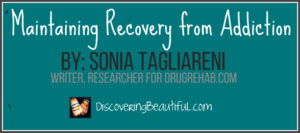Recovery is a lifelong process that extends far beyond substance abuse treatment. Maintaining abstinence is paramount if an individual wants to lead a drug and alcohol free life.
Substance abuse treatment is difficult on patients but maintaining recovery after treatment is equally challenging. The people in recovery need to stay away from environmental triggers and learn to recognize their own psychological and emotional triggers. They also need to focus on developing healthy reactions to stress from their personal and professional lives.
According to the Substance Abuse and Mental Health Services Administration, the four pillars of a successful recovery are:
- Health — Make wise and healthy decisions to stay away from substances of abuse.
- Home — Invest in a stable, safe and stress-free place to live while recovering from drug and alcohol abuse.
- Purpose — Partake in activities that contribute to an individual’s worth in society, such as a job, school, volunteering and creative activities.
- Community — Creating meaningful relationships and social networks with members of the community can provide support, love, friendship and hope throughout recovery.
Abstinence from drugs and alcohol is a lifestyle that individuals need to adopt. In some cases, the living situations of former substance users are not ideal for their continued recovery from a substance use disorder. Destructive living environments can cause the former drug and alcohol users to relapse, hindering their recovery.
Transitional housing, such as sober living homes provide a safe and substance-free environment for people in recovery, allowing them to acquire the proper tools that will facilitate their societal reintegration. If sober homes are not an option, the person in recovery should seek out supportive friends and family with healthy lifestyles.
Former substance users may also need to attend more meetings, surround themselves with people who support recovery, structure their lives and avoid external triggers, including places where they used to buy or use drugs and former alcohol-consuming friends.
Managing Triggers
Managing triggers plays an important part in maintaining recovery from substance abuse.
Internal triggers are more challenging to manage than external triggers because they involve thoughts and feelings that the individual associates with substance abuse. These cues can deter recovery and lead to relapse.
Through counseling and therapy, individuals recovering from drug and alcohol abuse can learn to train their brains to dissociate their thoughts and feelings from substances of abuse. Therapists will teach them to identify triggers through questions and offer healthy coping skills to constructively deal with thoughts that would otherwise lead to relapse.
Identifying triggers is essential to recovery — the sooner a person learns to recognize and identify factors that might drive them to use substances, the greater their chances of abstinence.
Written By Sonia Tagliareni
Sonia Tagliareni is a writer and researcher for DrugRehab.com. She started her professional writing career in 2012 and has since written for the finance, engineering, lifestyle and entertainment industry. Sonia holds a bachelor’s degree from the Florida Institute of Technology.
Sources:
National Institute on Drug Abuse. (n.d.). An Individual Drug Counseling Approach to Treat Cocaine Addiction. Retrieved from http://archives.drugabuse.gov/TXManuals/IDCA/IDCA11.html
Substance Abuse and Mental Health Services Administration. (2015, October 5). Recovery and Recovery Support. Retrieved from http://www.samhsa.gov/recovery
Polcin, D.L. et al. (2010, December). What Did We Learn from Our Study on Sober Living Houses and Where Do We Go from Here. Retrieved from https://www.ncbi.nlm.nih.gov/pmc/articles/PMC3057870/
Substance Abuse and Mental Health Service Administration. (1999). Treatment for Stimulant Use Disorders. Retrieved from https://www.ncbi.nlm.nih.gov/books/NBK64332/#A58353
